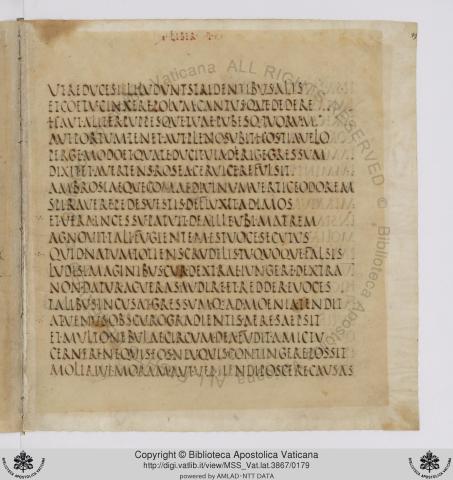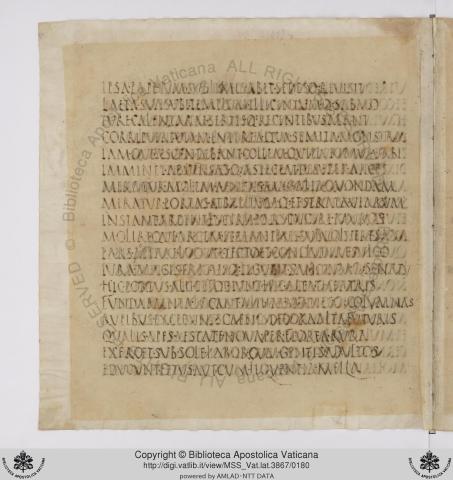Dīxit et āvertēns roseā cervīce refulsit,
ambrosiaeque comae dīvīnum vertice odōrem
spīrāvēre; pedēs vestis dēflūxit ad īmōs,
et vēra incessū patuit dea. Ille ubi mātrem405
agnōvit tālī fugientem est vōce secūtus:
'Quid nātum totiēns, crūdēlis tū quoque, falsīs
lūdis imāginibus? Cūr dextrae iungere dextram
nōn datur ac vērās audīre et reddere vōcēs?'
Tālibus incūsat gressumque ad moenia tendit.410
At Venus obscūrō gradientēs āëre saepsit,
et multō nebulae circum dea fūdit amictū,
cernere nē quis eōs neu quis contingere posset
mōlīrīve moram aut veniendī poscere causās.
Ipsa Paphum sublīmis abit sēdēsque revīsit415
laeta suās, ubi templum illī, centumque Sabaeō
tūre calent ārae sertīsque recentibus hālant.
notes
Manuscripts: M 402-407, 408-417 | P 402-414, 415-417 | R 402-414, 415-417 | G
Venus reveals herself in all her beauty and majesty: she hides Aeneas and Achates in a cloud of mist, and floats away to Paphos, happily (Austin).
402: avertens: intransitive (F-B). Supply se (Frieze). cervice: ablative of specification (Chase) (AG 418). refulsit: “flashed back.” (F-B). Expresses the “sudden blaze of majesty” (Storr).
403: ambrosiae: Ambrosia was the food of the gods, as nectar was their drink. In an extended sense it refers to the unguent with which the immortals anoint themselves (Storr). Ambrosiae implies both divinity and the mysterious fragrance associated with it, expressed and explained in divinum odorem (Austin). vertice: “from her head” (Frieze) (AG 403.1).
404: vestis defluxit: her dress had been girded up like that of a huntress, but now suddenly fell in folds around her person (Frieze).
405: et vera incessu patuit dea: “and in her tread was revealed, a very goddess.” (F-B). patuit: used in a kind of passive sense, “was manifest a goddess” (G-K). dea: dea is a predicate nominative (F-B). The gods glided along with very easy motion (Walpole). dea. Ille: the hiatus is justified by the full stop (Storr). Ille: i.e., Aeneas (Robertson).
406: est…secutus: supply eam (Robertson).
407: quid: adverbial “why?” (Robertson). totiens: must be taken somewhat laxly, as Venus had appeared to Aeneas only once before (Walpole). tu quoque: i.e., as well as Juno and other gods (F-B). falsis imaginibus: “with vain phantoms” (F-B).
408: dextrae: sc. manui (Carter). iungere and miscere are followed by the dative, by the ablative with cum, or by the ablative without a preposition (Frieze). dextram: sc. manum (Chase).
409: datur: it is permitted, allowed, granted, + infinitive (L-S s.v. do II.B.2). veras voces: “words without disguise” (F-B).
410: talibus: sc. verbis (F-B). incusat: sc. eam (Walpole). moenia: the walls of Carthage, of which Venus has just spoken (Frieze).
411: obscuro aëre: “with a mist” (F-B). gradientes: sc. eos (Walpole). Plural, because Achates is with Aeneas (F-B).
412: et multo...amictu: “and enveloped them, goddess as she was, in a thick mantle of cloud.” circum is separated from fudit by tmesis. Dea, which is in apposition with Venus, acquires special emphasis from its position with the verb. The line repeats and emphasizes the sense of the proceeding line (F-B).
413: eos: the pronoun is is rare in elevated poetry (F-B). neu: for neve, “or lest” (Frieze). contingere: “touch,” “lay hands on” (Knapp).
414: moliri: “to contrive”: used of operations which require great labor and preparation (Chase). moliri for facere, probably because of the alliteration (moliri … moram) (F-B). poscere: = quaerere (Carter).
415: ipsa: “she herself,” i.e., Venus (Robertson). Contrasted with Aeneas (Frieze). Paphum: acc. of place to which after abit (Robertson) (AG 427). Paphos was a city in Cyprus, famous for its cult of Venus (F-B) [add image]. sublimis: “aloft,” like an adverb (F-B). An adv., “through the air” (Knapp). sedes: “shrines” (Carter).
416: laeta: no longer tristis (see 228) since the interview with Jupiter (Frieze). Glad not only on account of her return to her loved home, but of her task fulfilled (Storr). templum illi: sc. est (F-B). illi: dative of possession (Carter) (AG 373).
416–417: Sabaeo ture: this is the “incense from Sheba” to which there are numerous Biblical references (F-B). The Sabaeans were a people of Arabia (Walpole).
417: ture: no victims were slain at the shrines of Venus; she was worshiped with incense and flowers (Frieze). halant: “are fragrant with” (Carter).
vocabulary
āvertō, vertī, versus, 3, a.: to turn (anything) away from, followed by an abl. with or without a prep., 1.38, et al.; turn or drive away, 1.472, et al.; transfer, with acc. of place, 4.106; drive away, end, 4.547; neut. by omission of se, to turn away, 1.402; (pass.), avertī, as middle or dep., with acc., to be averse to; to shun, loathe.
roseus, a, um: adj. (rosa), pertaining to roses; rose-colored; rosy, 1.402.
cervīx, īcis, f.: the neck, including the back or nape of the neck, 1.477, et al.
refulgeō, fulsī, fulsus, 2, n.: to flash back; shine forth, flash, be radiant, 1.402; glitter, glisten, 6.204.
ambrosius, a, um: adj. (ambrosia), ambrosial, heavenly, divine, 1.403.
dīvīnus, a, um: adj. (dīvus), relating to the gods; heaven-descended, divine, 5.47; heavenly, 1.403; inspired, prophetic, 3.373.
vertex, icis, m.: a whirl; whirlpool, 7.567; vortex, 1.117; whirling column of flame, 12.673; the top, crown of the head, the head, 1.403; summit, top, 1.163; mountain summit, height, 3.679; ā vertice, from on high, from above, 1.114. (vertō)
odor, ōris, m.: scent, smell, odor, fragrance, 1.403; disagreeable odor, stench, 3.228; foul fumes, 12.591.
spīrō, āvī, ātus, 1, n. and a.: to breathe, blow, 5.844; palpitate, 4.64; pant; breathe heavily, 7.510; heave, boil, 10.291; of odors, breathe forth, exhale, emit; w. acc., 1.404; p., spīrāns, antis, lifelike, breathing, 6.847.
dēfluō, fluxī, fluxus, 3, n.: to flow down; sail down, 8.549; alight, descend, 11.501; fall, descend, 1.404.
incessus, ūs, m.: a walking or advancing; a manner of walking; walk, gait, 1.405. (incēdō)
adgnoscō, nōvī, nitus, 3, a.: to recognize, 1.470.
totiēns (totiēs): num. adj. (tot), so many times, so often, 1.407, et al.
crūdēlis, e: adj. (crūdus), unfeeling, ruthless, cruel, inhuman, 2.124; relentless, 1.547; unnatural, 6.24; mortal, deadly, 2.561; bloody, 1.355; bitter, 1.361.
lūdō, lūsī, lūsus, 3, n. and a.: to play, frolic, sport, 1.397, et al.; play with dice, 9.336; make sport of, mock, delude, deceive, 1.352; make one's sport, 11.427.
atque, or ac: (conj.), and in addition, or and besides; and, as well, and indeed, and, 1.575; freq.; even, 2.626; in comparisons, as, 4.90; than, 3.561.
incūsō, āvī, ātus, 1, a.: to bring a cause or case against any one; to accuse, reproach, blame, 2.745; without object, upbraid, complain, 1.410. (1. in and causa)
gressus, ūs, m.: a stepping; step, walk, course, way, 1.401; of a ship, 5.162; air, mien, gait, 5.649; ferre gressum, to walk, 6.677; efferre gressum, to go forth or out, 2.753; comprimere gressum, to stop, stay one’s steps, 6.389. (gradior)
Venus, eris, f.: Venus, goddess of love and beauty, identified by the Romans with Aphrodite, daughter of Jupiter and Dione, 1.411, et al.; (meton.), love, lust, 6.26.
obscūrus, a, um: (adj.), dim, dark, dusky, obscure, 1.411; uncertain; of persons, unseen, 2.135; in the darkness, 6.268; pl., obscūra, ōrum, dim places; obscurity, uncertainty, 6.100.
gradior, gressus sum, 3, dep. n.: to step, walk, go, 1.312; move, advance, 10.572.
saepiō, saepsī, saeptus, 4, a.: to fence in; inclose, surround, 1.506; envelop, 1.411. (saepēs, inclosure)
nebula, ae, f.: a cloud, 10.82; mist, fog, 1.412.
circumfundō, fūdī, fūsus, 3, a.: to pour around; to encompass, surround; (pass.), circumfundor, fūsus sum, (in middle signif.), to rush around, surround, 2.383; p., circumfūsus, a, um, surrounding, 1.586; gathering around, 6.666.
amictus, ūs, m.: a veiling or draping of the person; an upper garment, covering; cloak, mantle, veil, 3.405; 5.421. (amiciō)
quis, qua or quae, quid or quod: (indef. pron., adj., and subst.), any, some, 2.94, et al.; some one, any one, any body, anything, something, 1.413, et al.; sī quis, nē quis, etc., if any, lest any, etc., freq.; (adv.), quid, as to anything, in anything, at all, freq.; sī quid, if at all, freq.
nēve or neu: (conj.), or not, and not, nor, neither, w. subj. or imperat., 7.202; ne — neu (nēve), that not — nor, lest — or lest, 2.188.
possum, potuī, posse, irreg. n.: to be able; can, 1.242, et al.; to avail, have influence, power, 4.382. (potis and sum)
mōlior, ītus sum, 4, dep. a. and n.: to pile up; build, erect, construct, 1.424; plan, undertake, attempt, 2.109; pursue, 6.477; cleave, 10.477; contrive, devise, 1.564; occasion, 1.414; prepare, equip, 4.309; arrange, adjust, 12.327; of missiles, discharge, hurl, 10.131. (mōlēs)
veniō, vēnī, ventus: to come, freq.; come forth; approach, 6.755; rise, appear, 1.353; dawn, 10.241; to present one's self or itself, 5.344; descend, spring from, 5.373; impers., ventum est, we, they came or have come, 4.151.
Paphos (-us), ī, f.: Paphos, a town in the western part of Cyprus, devoted to the worship of Venus, 1.415.
sublīmis, e: (adj.), raised up, elevated, uplifted, 11.602; aloft; on high, 1.259; through the air, 1.415; on high, 6.720; to heaven, 5.255; of lofty soul, 12.788; (adv.), sublīme, loftily, aloft, on high, 10.664.
abeō, īvī, or iī, itus, īre, irreg. n.: to go away, depart, 2.675; go off, go aside, turn off, 5.162; pass into, sink into, 9.700; go forward, take the lead, 5.318; retreat, 2.382; change or be transformed.
revīsō, 3, a. and n.: to look at again; visit again, return to see; return to, 2.760; revisit, 3.318.
Sabaeus, a, um: adj. (Saba), Sabaean, Arabian, 1.416; pl., Sabaeī, ōrum, m., the Sabaeans or people of Arabia Felix.
tūs, tūris, n.: incense, 1.417, et al.
caleō, uī, 2, n.: to be warm; to glow, 1.417.
serta, ōrum, n.: things entwined; garlands, festoons, wreaths, 1.417, et al. (sero, serere, serui, sertus)
hālō, āvī, ātus, 1, a. and n.: to breathe; exhale or emit odor; be fragrant or redolent, 1.417.


